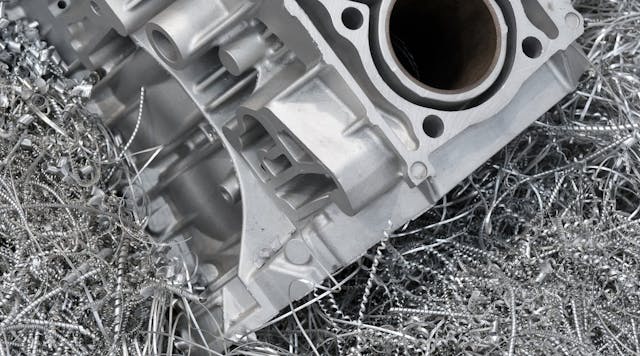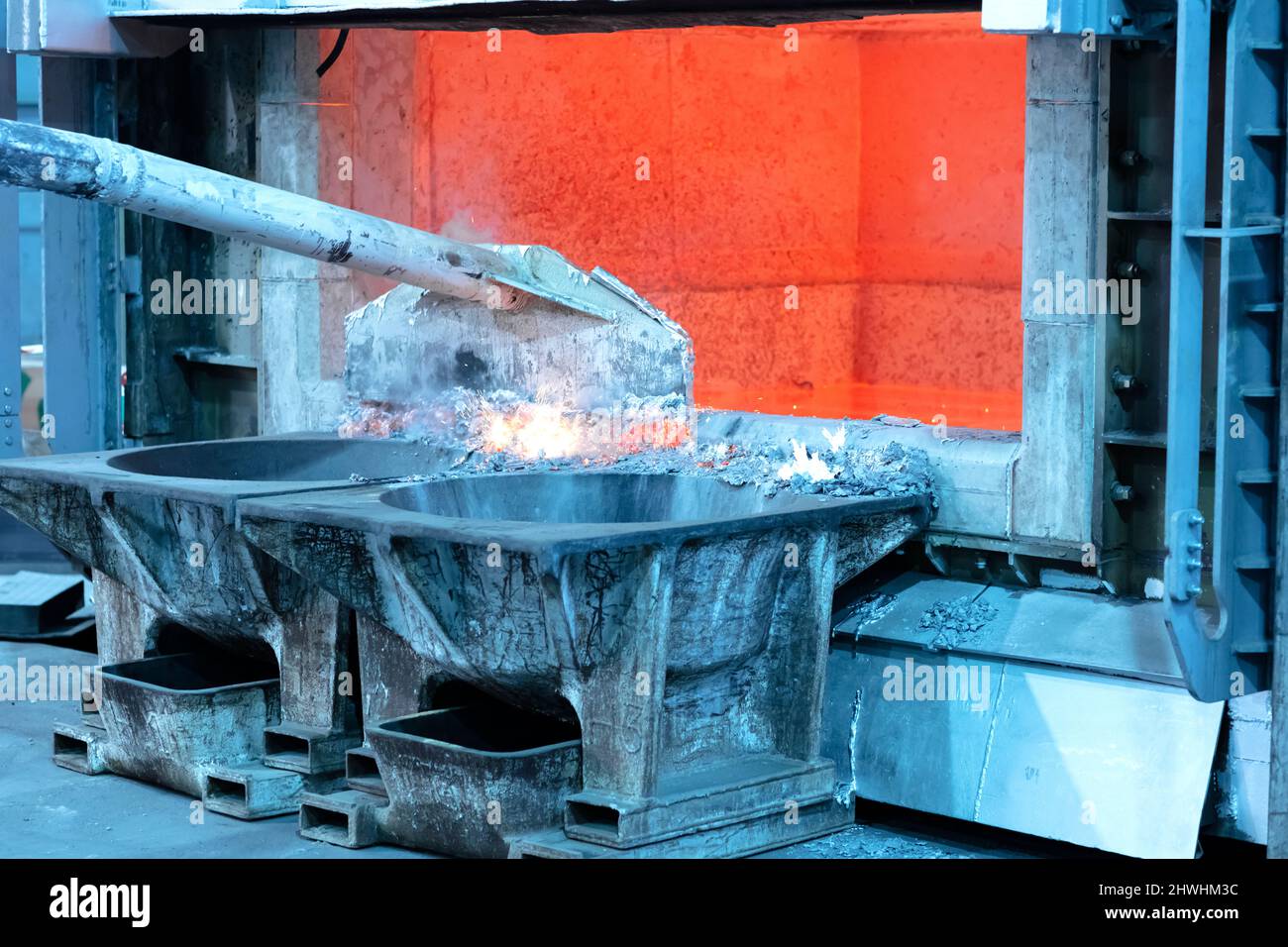Looking into Aluminum Foundry Wisconsin and its role in metal casting
Understanding the Perks and Innovations in the Aluminum Foundry Sector
The Aluminum Foundry sector plays a vital duty in contemporary manufacturing. Its lightweight homes especially boost gas effectiveness, especially in aerospace and automobile markets. Additionally, Aluminum's resistance to deterioration warranties longevity in different applications. As the sector evolves, advancements such as innovative recycling and additive manufacturing are improving production techniques. Checking out these advancements reveals not only the benefits however likewise the difficulties ahead for Aluminum foundries in a quickly altering market.
The Lightweight Advantage of Aluminum
Aluminum's lightweight nature provides considerable advantages across various industries, particularly in manufacturing and transport. Its reduced thickness permits the production of elements that are easier to handle and install, leading to decreased labor costs and boosted effectiveness. In the automobile industry, lighter cars add to enhanced fuel economy and reduced emissions, straightening with international sustainability goals. In aerospace, the usage of Aluminum reduces the total weight of airplane, which is essential for improving performance and minimizing functional expenses.
Additionally, Aluminum's light-weight homes help with cutting-edge styles that were formerly unfeasible with larger products. This flexibility enables suppliers to produce complex forms and structures while maintaining architectural stability. Overall, the lightweight benefit of Aluminum not only improves item efficiency yet likewise drives developments in innovation and style, making it a preferred material in different applications.
Corrosion Resistance and Longevity
The Aluminum Foundry industry is renowned for creating materials with remarkable deterioration resistance, making them perfect for numerous applications. This building, combined with enhanced structural stability, adds to the resilient efficiency benefits that Aluminum elements use. Consequently, industries significantly rely upon Aluminum to meet demanding ecological problems without endangering quality.
Superior Corrosion Resistance
While different steels encounter substantial difficulties from ecological aspects, Aluminum stands out for its remarkable rust resistance, making it a favored choice in lots of applications. This home is mainly because of an all-natural oxide layer that forms on the Aluminum surface, providing an obstacle against wetness and destructive agents. Unlike various other steels that might rust or deteriorate with time, Aluminum maintains its honesty also in rough atmospheres, such as coastal areas or commercial setups. In addition, its light-weight nature integrated with rust resistance makes it optimal for applications in aerospace, automobile, and marine industries. Overall, Aluminum's phenomenal resilience not only boosts product longevity yet additionally decreases maintenance expenses, presenting an engaging benefit for customers and producers alike.
Boosted Architectural Stability
Developers and engineers significantly acknowledge the relevance of boosted structural honesty in modern applications, where both rust resistance and longevity are essential. Aluminum alloys, understood for their light-weight buildings, likewise exhibit phenomenal resistance to corrosion, making them ideal for severe settings. The innovative techniques used in the Aluminum Foundry industry contribute substantially to producing elements with boosted sturdiness. Advanced casting procedures and alloy compositions are tailored to fulfill specific performance needs, guaranteeing that frameworks can hold up against extreme problems without endangering integrity. Surface treatments and layers enhance the lifespan of Aluminum products, even more reducing degeneration over time. This emphasis on improved architectural honesty not just expands the use of materials but also reduces maintenance costs, solidifying Aluminum's position as a product of choice in various industries.
Long-lasting Efficiency Benefits
Long-lasting performance in Aluminum components is greatly associated to their premium deterioration resistance and resilience. Unlike numerous metals, Aluminum naturally forms a safety oxide layer, which prevents corrosion and damage in various environments, consisting of marine and industrial settings. This integral building significantly expands the life expectancy of Aluminum items, reducing upkeep and substitute costs. Furthermore, the light-weight nature of Aluminum boosts its applicability throughout sectors without jeopardizing strength. The product's resistance to deterioration additionally adds to its reliability popular applications, making it an optimal selection for automobile, aerospace, and building industries. As sectors increasingly focus on sustainability and durability, Aluminum's performance advantages line up with modern design needs, strengthening its duty in ingenious manufacturing procedures.
Environmental Impact and Sustainability
 As the Aluminum Foundry sector advances, it progressively focuses on ecological influence and sustainability, recognizing the need for liable techniques in the face of climate change. Initiatives to minimize waste and energy consumption go to the leading edge, with numerous factories embracing recycling initiatives to redeem Aluminum scrap. This not only Read Full Article lowers resources usage yet likewise especially lowers power expense, as recycled Aluminum requires only a portion of the power contrasted to primary manufacturing.
As the Aluminum Foundry sector advances, it progressively focuses on ecological influence and sustainability, recognizing the need for liable techniques in the face of climate change. Initiatives to minimize waste and energy consumption go to the leading edge, with numerous factories embracing recycling initiatives to redeem Aluminum scrap. This not only Read Full Article lowers resources usage yet likewise especially lowers power expense, as recycled Aluminum requires only a portion of the power contrasted to primary manufacturing.Improvements in discharges regulate modern technologies are being carried out to lower air contaminants, lining up operations with stricter environmental regulations. Shops are also exploring alternative power resources, such as solar and wind, to power their centers sustainably. By cultivating cooperation with stakeholders, the sector aims to create innovative solutions that boost eco-friendly stewardship. Jointly, these campaigns highlight a dedication to minimizing the Aluminum Foundry's carbon footprint while promoting a circular economy within the production market.
Advanced Production Techniques
 Changing manufacturing procedures, the Aluminum Foundry market is increasingly incorporating sophisticated production techniques to enhance efficiency and precision. Techniques such as computer system numerical control (CNC) machining and additive production have become vital components in enhancing production operations. CNC machining permits for high-precision part manufacture, substantially minimizing material waste and manufacturing time. Additive manufacturing opens up brand-new avenues for complicated geometries and light-weight designs that were previously difficult to accomplish.
Changing manufacturing procedures, the Aluminum Foundry market is increasingly incorporating sophisticated production techniques to enhance efficiency and precision. Techniques such as computer system numerical control (CNC) machining and additive production have become vital components in enhancing production operations. CNC machining permits for high-precision part manufacture, substantially minimizing material waste and manufacturing time. Additive manufacturing opens up brand-new avenues for complicated geometries and light-weight designs that were previously difficult to accomplish.Additionally, the release of automation and robotics in Aluminum foundries enhances procedures, decreases human error, and enhances employee safety. These technologies help with an even more receptive production environment, enabling makers to adjust quickly to market demands. The integration of innovative simulation software even more improves the design and screening stages, causing premium product high quality. Jointly, these methods not just improve operational efficiency however additionally foster development, positioning the Aluminum Foundry industry at the forefront of modern manufacturing.
Technologies in Reusing Procedures
The Aluminum Foundry industry is not just progressing in manufacturing techniques but is additionally making substantial strides in recycling processes. Innovations are arising to improve the effectiveness of recycling methods, lowering energy intake and improving sustainability. Advanced arranging modern technologies, such as automatic optical sorting, enable the recognition and separation of Aluminum from other products with high precision. pop over to this web-site This causes a greater high quality of recycled Aluminum, which is important for maintaining the integrity of the end products.
Additionally, closed-loop recycling systems are being executed, permitting manufacturers to recycle Aluminum scrap within their own production procedures. This minimizes waste and advertises a circular economic situation. Additionally, research right into brand-new recycling methods, such as hydrometallurgical procedures, offers the possibility for recovering Aluminum from intricate waste streams. These developments not just add to lowering the carbon footprint of the Aluminum Foundry market yet likewise boost its economic feasibility in a progressively ecologically conscious market.
Applications Across Numerous Industries
Numerous industries are significantly recognizing the flexibility and advantages of Aluminum Foundry items, bring about extensive applications throughout industries such as automotive, aerospace, customer, and construction goods. In the auto sector, Aluminum spreadings add to lightweight automobile layouts, enhancing fuel efficiency and efficiency. Aerospace manufacturers utilize Aluminum elements for their strength-to-weight ratio, essential for airplane frameworks and parts.
In building and construction, Aluminum is preferred for its sturdiness and resistance to deterioration, making it ideal for home window structures, roofing, and structural supports. Customer items also gain from Aluminum Foundry products, as seen in kitchenware, electronic devices, and packaging, where lightweight and recyclable materials are important.
The adaptability of Aluminum Foundry techniques enables elaborate designs and precise specifications, dealing with the varied needs of these markets. Consequently, Aluminum Foundry products are ending up being indispensable to modern-day production processes across various sectors.
Future Trends in Aluminum Foundries
As sectors remain to progress, Aluminum foundries are poised to embrace numerous crucial trends that promise to improve efficiency and sustainability. One noticeable pattern is the enhancing adoption of electronic innovations, including automation and artificial knowledge, which simplify operations and improve quality assurance. In addition, the push in the direction of sustainable practices is leading shops to purchase recycling modern technologies, greatly minimizing waste and energy intake.
 Another arising trend is the usage of sophisticated alloys and products, dealing with the growing need for durable and light-weight components throughout different sectors (Aluminum Foundry). The integration of additive manufacturing methods is prepared for to revolutionize component layout, offering customization and reducing lead times.
Another arising trend is the usage of sophisticated alloys and products, dealing with the growing need for durable and light-weight components throughout different sectors (Aluminum Foundry). The integration of additive manufacturing methods is prepared for to revolutionize component layout, offering customization and reducing lead times.Collaboration with research study organizations is additionally anticipated to drive development, as factories seek to establish brand-new procedures and materials. Aluminum Foundry. Collectively, these patterns suggest a transformative future for the Aluminum Foundry market, aligning with wider goals of sustainability and effectiveness
Regularly Asked Inquiries
What Are the Typical Costs Associated With Aluminum Foundry Production?
The typical costs connected with Aluminum Foundry production include resources, labor, energy, tools upkeep, and overhead expenditures. These variables jointly affect the general monetary investment required for efficient Aluminum casting operations.
Just How Does Aluminum Contrast to Various Other Metals in Stamina?
Aluminum, while lighter than numerous metals, exhibits outstanding strength-to-weight ratios. Contrasted to steel, Aluminum is much less solid however uses exceptional rust resistance, making it a desirable selection in applications where weight and resilience are vital.
What Precaution Are in Place in Aluminum Foundries?
Safety and security actions in Aluminum factories generally include mandatory individual protective tools, air flow systems to manage fumes, regular tools maintenance, training programs for employees, and adherence to strict safety laws to lessen threats connected with molten metal handling.
Exactly How Is Quality Assurance Managed in Aluminum Spreading Processes?
Quality control in Aluminum casting procedures involves strenuous evaluations at numerous phases, including resources evaluation, procedure surveillance, and last product screening. navigate to these guys Strategies such as statistical procedure control and non-destructive screening guarantee adherence to sector requirements.
What Certifications Are Essential for Aluminum Foundry Distributors?
The significance of qualifications for Aluminum Foundry suppliers consists of ISO 9001 for quality administration, ISO 14001 for ecological management, and industry-specific requirements like ASTM and SAE, making sure conformity, safety, and integrity in making processes.
The Aluminum Foundry market plays an important duty in modern manufacturing. The Aluminum Foundry market is renowned for generating materials with exceptional rust resistance, making them ideal for different applications. Changing manufacturing processes, the Aluminum Foundry industry is progressively incorporating innovative manufacturing techniques to enhance effectiveness and accuracy. The Aluminum Foundry sector is not just progressing in making techniques however is likewise making considerable strides in reusing procedures. As markets continue to evolve, Aluminum factories are positioned to welcome several crucial trends that promise to enhance efficiency and sustainability.